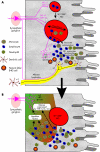The role of the sympathetic nervous system in intestinal inflammation
- PMID: 17047110
- PMCID: PMC1860105
- DOI: 10.1136/gut.2006.091322
The role of the sympathetic nervous system in intestinal inflammation
Abstract
The nervous system in the intestine controls motility, secretion, sensory perception, and immune function. Peptidergic neurones with neurotransmitters such as substance P and nerve growth factors have been the main focus of neuroimmunomodulation research in the gut. This review summarises the present knowledge concerning the role of the sympathetic nervous system (SNS) in modulating intestinal inflammation. The role of the SNS for gut inflammation is compared with its role in rheumatoid arthritis which demonstrates notable similarities. Nerve fibres of the SNS not only enter the enteric plexuses but also innervate the mucosa and gut associated lymphoid tissue (GALT). The SNS has pro- and anti-inflammatory functions. Neurotransmitters such as norepinephrine, adenosine, and others can evoke remarkably different opposing effects depending on concentration (presence of sympathetic nerve fibres and extent of neurotransmitter release), receptor affinity at different receptor subtypes, expression of adrenoceptors, availability of cotransmitters, and timing of SNS activity in relation to the inflammatory course. This review attempts to integrate the different perspectives of the pro- and anti-inflammatory effects of the SNS on inflammatory disease of the gut.
Conflict of interest statement
Conflict of interest: None declared.
Similar articles
-
Sympathetic neurotransmitters in joint inflammation.Rheum Dis Clin North Am. 2005 Feb;31(1):43-59, viii. doi: 10.1016/j.rdc.2004.09.003. Rheum Dis Clin North Am. 2005. PMID: 15639055 Review.
-
Neural regulation of gastrointestinal inflammation: role of the sympathetic nervous system.Auton Neurosci. 2014 May;182:83-8. doi: 10.1016/j.autneu.2013.12.003. Epub 2013 Dec 22. Auton Neurosci. 2014. PMID: 24412637 Review.
-
Clinical and experimental evidence of sympathetic neural dysfunction during inflammatory bowel disease.Clin Exp Pharmacol Physiol. 2009 Oct;36(10):1026-33. doi: 10.1111/j.1440-1681.2009.05242.x. Epub 2009 Jun 29. Clin Exp Pharmacol Physiol. 2009. PMID: 19566829 Review.
-
Neurogenic regulation of dendritic cells in the intestine.Biochem Pharmacol. 2010 Dec 15;80(12):2002-8. doi: 10.1016/j.bcp.2010.06.034. Epub 2010 Jul 6. Biochem Pharmacol. 2010. PMID: 20615391 Review.
-
The B cell, arthritis, and the sympathetic nervous system.Brain Behav Immun. 2010 Feb;24(2):186-92. doi: 10.1016/j.bbi.2009.07.002. Epub 2009 Jul 16. Brain Behav Immun. 2010. PMID: 19616611 Review.
Cited by
-
Impact of Comorbid Psychiatric Disorders on Healthcare Utilization in Patients with Inflammatory Bowel Disease: A Nationally Representative Cohort Study.Dig Dis Sci. 2022 Sep;67(9):4373-4381. doi: 10.1007/s10620-022-07505-9. Epub 2022 May 3. Dig Dis Sci. 2022. PMID: 35503486
-
A Review of Inflammatory Bowel Disease: A Model of Microbial, Immune and Neuropsychological Integration.Public Health Rev. 2021 May 5;42:1603990. doi: 10.3389/phrs.2021.1603990. eCollection 2021. Public Health Rev. 2021. PMID: 34692176 Free PMC article. Review.
-
Cirrhosis-associated immune dysfunction.Nat Rev Gastroenterol Hepatol. 2022 Feb;19(2):112-134. doi: 10.1038/s41575-021-00520-7. Epub 2021 Oct 26. Nat Rev Gastroenterol Hepatol. 2022. PMID: 34703031 Review.
-
Neuroanatomy of lower gastrointestinal pain disorders.World J Gastroenterol. 2014 Jan 28;20(4):1005-20. doi: 10.3748/wjg.v20.i4.1005. World J Gastroenterol. 2014. PMID: 24574773 Free PMC article. Review.
-
Cardiovascular abnormalities in patients with major depressive disorder: autonomic mechanisms and implications for treatment.CNS Drugs. 2009;23(7):583-602. doi: 10.2165/00023210-200923070-00004. CNS Drugs. 2009. PMID: 19552486 Review.
References
-
- Selye H, Fortier C. Adaptive reactions to stress. Res Publ Assoc Res Nerv Ment Dis 1949293–18. - PubMed
-
- Levine J D, Goetzl E J, Basbaum A I. Contribution of the nervous system to the pathophysiology of rheumatoid arthritis and other polyarthritides. Rheum Dis Clin North Am 198713369–383. - PubMed
-
- Dhabhar F S, McEwen B S. Bidirectional effects of stress and glucocorticoid hormones on immune function: possible explanations for paradoxical observations. In: Ader R, Felten DL, Cohen N, eds. Psychoneuroimmunology. San Diego: Academic Press, 2001301–338.
-
- Johnson H M, Archer D L, Torres B A. Cyclic GMP as the second messenger in helper cell requirement for gamma‐interferon production. J Immunol 19821292570–2572. - PubMed
Publication types
MeSH terms
Substances
LinkOut - more resources
Full Text Sources
Medical





